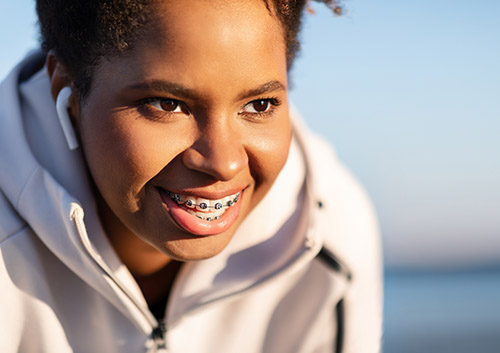
Orthodontists and dentists use advanced procedures to treat and save teeth. But sometimes, a tooth just can’t be saved and needs to be extracted. Sometimes it’s due to extensive decay, or infection, or serious injury. Or sometimes, to create a healthy bite, an extraction is necessary during orthodontic treatment.
When does an orthodontist recommend an extraction? Conditions which call for extraction include:
Not many people have enough space in their mouths for four wisdom teeth! And when there’s no room to erupt properly, wisdom teeth can become decayed or infected, push your other teeth out of place, and damage the roots of nearby molars. Extracting wisdom teeth protects your teeth and your bite alignment.
Usually, orthodontic treatment takes place before the wisdom teeth begin to erupt. But if yours start to make an appearance during treatment, your orthodontist and dentist will work together to schedule extraction without interfering too much with your orthodontic treatment plan.
Dr. Neil Oliveira and Dr. Derek Wolkowicz and the team at Orthodontic Specialists of Southeastern Massachusetts carefully plan your treatment based on examinations, X-rays, and/or 3D imaging. The goal is to align your teeth and jaws for an attractive smile and a healthy, functional bite. When overcrowding is severe, or if there is a serious malocclusion (bite problem), or if a particular tooth is unusually large or misshapen, your orthodontist might recommend an extraction.
Sometimes more room can be made for teeth with appliances such as palatal expanders or, in other cases, with the help of oral surgery. Extractions are only recommended when they are absolutely necessary.
- Baby Teeth Which Aren’t Coming Out
Baby teeth normally fall out in a predictable pattern. Front teeth first, canines and molars last. Baby teeth have small roots, and these roots begin to break down when the adult teeth underneath put pressure on them as they start to erupt. As the root gets smaller and smaller, the baby tooth gets looser and looser—until it falls out.
Sometimes, though, the roots of primary teeth don’t break down, and the baby teeth stay right where they are. This means that the permanent teeth have to erupt someplace else—usually behind those baby teeth. This creates a double row of teeth, and your permanent teeth can become crooked or overlap as they try to fit in. Extracting stubborn baby teeth allows your adult teeth to come in just where they’re supposed to. Because of their small roots, extracting primary teeth is usually simple and straightforward, and can be done in your dentist’s office.
Most of us have 32 adult teeth, including wisdom teeth. It’s rare, but sometimes an extra, or supernumerary, tooth develops. Your jaw is most probably not equipped to accommodate any extras, so, in this case, the extra tooth or teeth are removed to give the rest of the teeth the space they need to avoid overlapping or crowding.
When your orthodontist recommends an extraction, it’s because it’s important for your dental health. Dr. Neil Oliveira and Dr. Derek Wolkowicz will refer you to a dentist or a specialist like a periodontist or oral surgeon, who will:
- discuss the extraction procedure with you, including sedation options
- numb the area
- gently loosen and then extract the tooth
- provide options for pain management after the procedure
- give you detailed instructions for aftercare
- work with your orthodontist to keep your treatment on schedule
Extraction is never your first choice, or your orthodontist’s! But when an extraction is necessary for tooth and bite alignment, everyone at Orthodontic Specialists of Southeastern Massachusetts in New Bedford or Mattapoisett, MA will coordinate a treatment plan to create your best—and healthiest—smile.




